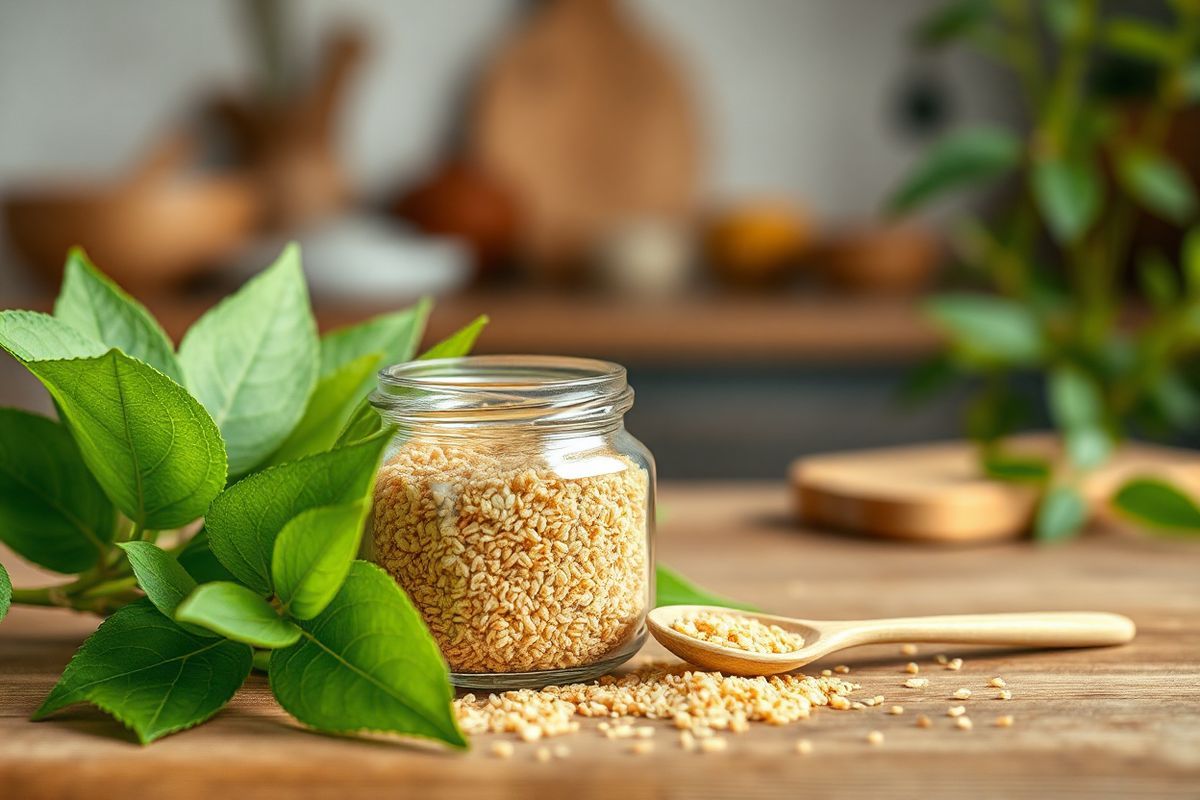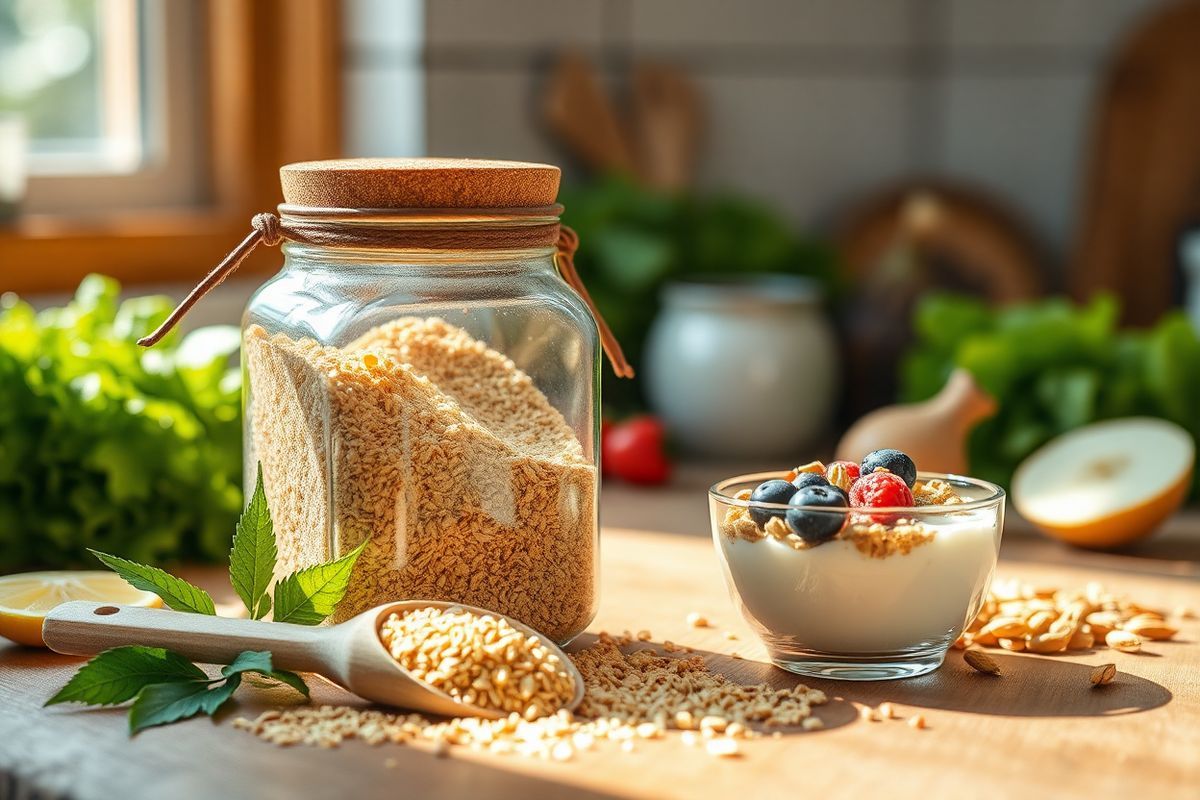Table of Contents
Understanding Psyllium Husk: What It Is and How It Works

Psyllium husk is derived from the seeds of the Plantago ovata plant, native to India. It is a soluble fiber that absorbs water and forms a gel-like substance in the gut, which can help regulate bowel movements and improve digestive health (Mount Sinai, n.d.).
When psyllium husk comes into contact with water, it swells and creates a gelatinous mass that aids in the transport of waste through the intestinal tract. This characteristic makes psyllium particularly effective for both constipation and diarrhea, as it can add bulk to stool while also forming a gel to slow down bowel movements when necessary (Mount Sinai, n.d.).
Moreover, the soluble fiber in psyllium can help lower cholesterol levels and regulate blood sugar levels, making it a versatile addition to one’s diet. It works by binding to bile acids in the gut, which are then excreted. This process prompts the liver to use cholesterol to replace the lost bile acids, thereby lowering overall cholesterol levels (Mount Sinai, n.d.).
The Connection Between Psyllium Husk and Acid Reflux Relief

Acid reflux, characterized by the backflow of stomach acid into the esophagus, can lead to heartburn. The gel-like consistency that psyllium husk forms in the digestive tract may help by acting as a physical barrier, potentially reducing the amount of acid that can reach the esophagus. By improving digestion and reducing the frequency of reflux episodes, psyllium husk may provide a natural method for managing heartburn.
Research suggests that increasing fiber intake, particularly soluble fibers like those found in psyllium, can help reduce the incidence of acid reflux symptoms. In one study, individuals with gastroesophageal reflux disease (GERD) reported fewer symptoms when consuming a fiber-rich diet (Mount Sinai, n.d.).
Benefits of Psyllium Husk for Heartburn: More Than Just a Laxative
While psyllium husk is widely recognized for its laxative properties, its benefits extend far beyond. Here are some notable advantages associated with its consumption:
-
Cholesterol Management: Psyllium has been shown to effectively lower LDL (bad) cholesterol levels. Studies indicate that regular intake can lead to significant improvements in cholesterol profiles, particularly when combined with a low-fat diet (Mount Sinai, n.d.).
-
Blood Sugar Control: For individuals with diabetes, psyllium husk can help manage blood sugar levels by slowing down the absorption of glucose in the bloodstream. This effect aids in maintaining stable blood sugar levels post-meal (Mount Sinai, n.d.).
-
Weight Management: Psyllium husk can promote feelings of fullness, which may help reduce overall calorie intake. This is particularly beneficial for those looking to manage their weight or curb cravings (Mount Sinai, n.d.).
-
Digestive Health: As a bulk-forming agent, psyllium may help regulate bowel movements, alleviating both constipation and diarrhea. This dual action enhances overall digestive health (Mount Sinai, n.d.).
-
Anti-inflammatory Effects: Some studies suggest that psyllium husk may have anti-inflammatory properties, which can be beneficial for individuals with inflammatory bowel diseases (IBD) (Mount Sinai, n.d.).
Potential Side Effects of Psyllium Husk: What You Need to Know
While psyllium husk is generally considered safe for most people, there are some potential side effects to be aware of:
-
Gastrointestinal Issues: Some individuals may experience bloating, gas, or abdominal discomfort when first incorporating psyllium into their diet. It is advisable to start with a small dose and gradually increase it to allow the body to adjust.
-
Allergic Reactions: Though rare, allergic reactions to psyllium husk can occur. Symptoms may include itching, rash, or difficulty breathing. If you experience these symptoms, discontinue use and consult a healthcare professional immediately.
-
Interaction with Medications: Psyllium husk can interfere with the absorption of certain medications. It is essential to take medications at least two hours before or after consuming psyllium to avoid any potential interactions (Mount Sinai, n.d.).
-
Dehydration: Since psyllium absorbs water, it is crucial to drink plenty of fluids when taking it. Insufficient hydration can lead to constipation or intestinal blockage.
Incorporating Psyllium Husk into Your Diet: Tips and Recommendations
Adding psyllium husk to your diet can be simple and effective. Here are some tips on how to do so:
-
Start Slow: If you are new to psyllium, begin with a small amount, such as one teaspoon per day, and gradually increase to the recommended dosage of one tablespoon, taken one to three times a day.
-
Mix with Liquids: Psyllium husk can be mixed with water, juice, or smoothies. Ensure you mix it thoroughly and drink it immediately, as it can thicken quickly.
-
Baking: Psyllium husk can be added to baked goods as a gluten substitute, especially in gluten-free recipes. It can help improve the texture and moisture retention in items like breads and muffins.
-
Sprinkle on Foods: Incorporate psyllium husk into your diet by sprinkling it on yogurt, oatmeal, or cereal for an extra fiber boost.
-
Hydration is Key: Always drink plenty of water when consuming psyllium husk to avoid any digestive discomfort.
FAQ
1. What is the recommended dosage of psyllium husk?
The general recommendation is to start with one teaspoon and gradually increase to one tablespoon taken one to three times a day, depending on individual tolerance.
2. Can psyllium husk help with weight loss?
Psyllium husk may aid in weight loss by promoting a feeling of fullness, which can help reduce overall calorie intake (Mount Sinai, n.d.).
3. Is psyllium husk safe for everyone?
Most people can safely consume psyllium husk; however, individuals with certain medical conditions or those taking specific medications should consult a healthcare professional before starting.
4. How should I store psyllium husk?
Store psyllium husk in a cool, dry place, away from moisture and heat, to maintain its efficacy.
5. Can I take psyllium husk with other medications?
It is advisable to take psyllium husk at least two hours before or after medications to prevent any absorption issues.
References
- Mount Sinai. (n.d.). Psyllium. Retrieved from https://www.mountsinai.org/health-library/supplement/psyllium



